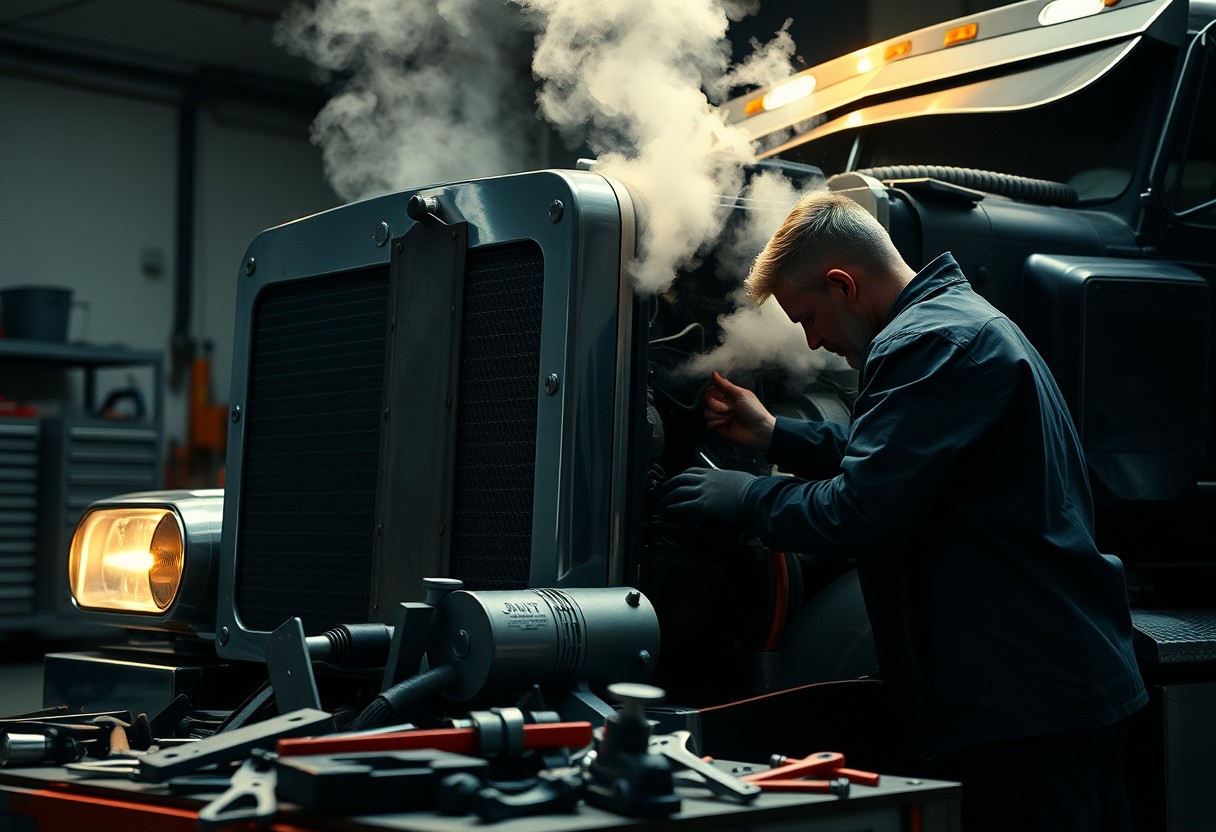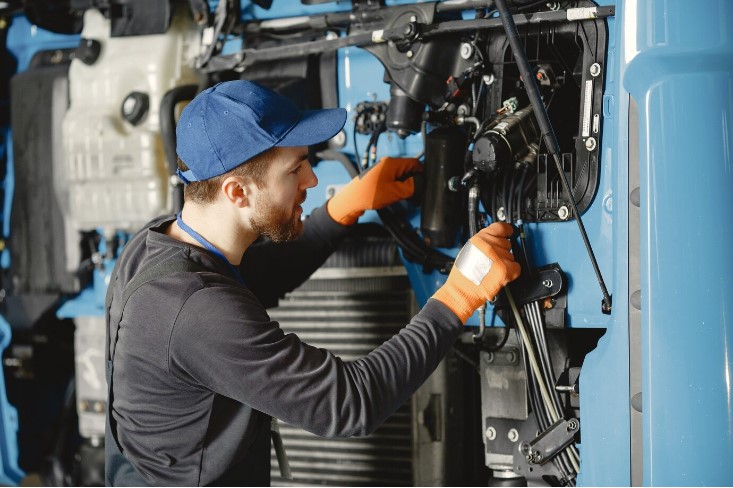Causes of Engine Overheating
While a truck’s engine overheating can be alarming, understanding its causes can help you address the issue effectively. Common reasons include cooling system failure, low coolant levels, thermostat issues, and water pump malfunctions. Identifying these problems early on can prevent serious damage and keep your truck running smoothly.
Cooling System Failure
An inadequate cooling system can lead to engine overheating. Components like the radiator, hoses, and coolant can wear down or become damaged over time, hindering their ability to dissipate heat effectively.Low Coolant Levels
Against initial assumptions, low coolant levels can significantly impact your engine’s temperature regulation. Coolant circulates through the engine to dissipate heat; insufficient coolant can lead to overheating during operation. This issue may arise due to leaks in the system or inadequate maintenance. Regularly checking your coolant level and topping it off when necessary can help you avoid overheating situations that may escalate into serious damage.Thermostat Issues
At times, a malfunctioning thermostat can cause your engine to overheat. The thermostat regulates coolant flow between the engine and the radiator. If it sticks closed, the engine will overheat as coolant can’t circulate effectively. Plus, changing your thermostat when you notice signs of potential failure, such as erratic temperature readings, can save you from costly repairs later. Staying attentive to how your truck operates helps in early detection, ensuring smoother performance.Water Pump Malfunctions
Below the surface, water pump malfunctions can also lead to engine overheating. The water pump is critical for circulating coolant throughout the engine. If it fails, your engine will heat up quickly as it lacks the necessary coolant flow. Engine overheating due to a faulty water pump can often manifest as leaks or unusual noises. Addressing these symptoms promptly by checking the pump and the entire cooling system can prevent extensive damage to both your engine and your vehicle as a whole.Signs of Overheating
One of the first indicators that your truck’s engine is overheating is noticeable signs such as a rising temperature gauge, warning lights, and even steam or smoke coming from the engine. These signs can help you quickly identify the issue and take the necessary precautions to avoid further damage to your vehicle.Temperature Gauge Readings
At the first sign of trouble, you should check your temperature gauge. The normal operating range for most trucks is between 180°F and 210°F. If the needle moves past this range, you can refer to the table below for guidance: Temperature Gauge Readings| Below 180°F | Engine is operating normally. |
| 180°F – 210°F | Normal operating temperature. |
| Above 210°F | Warning—engine may be overheating. |
Warning Lights
About warning lights on your dashboard, it’s imperative to pay attention to any alerts that may indicate overheating. If the temperature warning light illuminates, it signals that your engine’s temperature is exceeding the safe limit and requires immediate attention. Understanding these warning lights can aid in early detection of an overheating issue. Make it a habit to familiarize yourself with your truck’s dashboard indicators, as they play a vital role in keeping you informed about your engine’s health. Ignoring them could lead to severe engine damage.Steam or Smoke
Beside warning lights, the presence of steam or smoke is another severe sign that your engine might be overheating. You may notice vapor rising from under the hood, indicating that the engine has reached a dangerous temperature. Even if you see steam or smoke, it’s imperative to stop your vehicle as soon as it’s safe and assess the situation. Open the hood carefully to check for any visible leaks or damages, and ensure your safety from potential burns. Seek professional help if you suspect serious overheating issues. Your truck deserves prompt care to maintain its performance.
Immediate Steps to Take
After your truck’s engine shows signs of overheating, it’s important to act quickly to prevent further damage. Begin by pulling over in a safe location, away from traffic, and shut off your engine to allow it to cool down.Pull Over Safely
An ideal spot to pull over is somewhere flat and away from other vehicles. Use your turn signal to indicate your intention to stop, and be cautious of oncoming traffic as you manoeuver your truck to a safe area off the road.Turn Off the Engine
Against the urge to keep driving, it’s vital to turn off your engine immediately once you’ve safely parked. Continuing to operate an overheated engine can cause catastrophic damage, so prioritising its shutdown is key to protecting your vehicle. A quick action here can save you from expensive repairs in the long run. Wait a moment and ensure the vehicle is in a stable position, then turn the ignition off. This action prevents the engine from running at high temperatures, which could lead to serious mechanical failure.Allow the Engine to Cool – Truck Engine Over Heating
Before you attempt to investigate the cause of the overheating, give your engine time to cool down. Opening the hood will allow heat to escape, but avoid touching any parts until you are certain it is safe to do so. It’s important to be patient during this cooling period. Engine temperatures can remain high for a while, and trying to open the radiator cap or working on the engine too soon can lead to burns or other injuries. Wait at least 30 minutes before attempting any inspections or repairs.Diagnosing the Problem
All truck owners should know how to diagnose engine overheating issues. Start by assessing any warning signs and performing basic checks. Identifying the source of the problem will save you time and money on unnecessary repairs. With a systematic approach, you can determine whether it’s a simple fix or a more serious issue that requires professional assistance.Inspecting Coolant Levels
One of the first steps in diagnosing engine overheating is to inspect your coolant levels. Low coolant can lead to overheating, so check the reservoir and radiator for the appropriate fluid levels. If they are indeed low, you may need to top up the coolant with the correct type for your vehicle.Checking for Leaks
Against the backdrop of searching for issues, checking for leaks is crucial. You should look for signs of coolant puddling under your truck or any visible leaks around the hoses, radiator, and water pump. Detecting leaks early can help prevent further engine damage and more expensive repairs. Considering a thorough visual inspection of your truck’s components will help you detect any leaks more effectively. Look for wet spots or crusty deposits around gaskets and hoses, which may indicate a leak. Make sure to also check the water pump and hoses for wear and tear, as these components can degrade over time and lead to serious overheating issues if not addressed.Evaluating the Radiator
Among the various components in your cooling system, evaluating the radiator is vital. Ensure that it is not clogged with debris, which can impede the flow of coolant and lead to overheating. If necessary, clean the radiator and check for any signs of corrosion or damage that may require replacement. Coolant flow is highly dependent on a well-functioning radiator. If your radiator is damaged or blocked, it can significantly reduce the cooling efficiency of your engine. Be sure to check for bent fins or dirt build up, as these can obstruct airflow. Regular maintenance and cleaning of your radiator can help prevent engine overheating and extend the life of your truck’s cooling system.Preventive Maintenance – Truck Engine Over Heating
Unlike some vehicle components, your truck’s engine requires consistent preventive maintenance to avoid overheating issues. Regularly addressing elements such as fluid levels, inspections, and monitoring can extend your engine’s life and enhance its performance. By incorporating these practices, you can save yourself from potential breakdowns and costly repairs.Regular Fluid Checks
Before each journey, check your truck’s necessary fluids, including engine oil, coolant, and transmission fluid. Ensuring these fluids are at optimal levels helps maintain proper engine function and prevents overheating. Make fluid checks a part of your routine for the best results.Routine Inspections
Above all, conducting routine inspections can help you catch potential issues before they escalate. Regularly examine the belts, hoses, and radiator to identify any wear or leaking that might lead to overheating problems. Staying proactive is necessary for maintaining your engine’s health. Understanding your truck’s components and how they work together allows you to identify possible failure points during routine inspections. Pay special attention to the radiator, as clogs or leaks might significantly affect the engine’s temperature regulation. Additionally, examining hoses for cracks or rigidity can prevent coolant leaks and overheating before they turn into serious issues.Temperature Gauge Monitoring
Along with regular inspections, you should consistently monitor your truck’s temperature gauge. Keeping an eye on the gauge allows you to detect any sudden temperature rises that may indicate overheating and prompt immediate action. Checks of your temperature gauge at various intervals throughout your drive can provide insight into how well your truck is performing. When the gauge shows a rise above the normal range, you should pull over, allowing the engine to cool and prevent any lasting damage. Regularly monitoring this gauge is vital for early intervention and maintaining engine health. Temperature Gauge Monitoring| Action | Frequency |
| Check temperature gauge | Every drive |
| Inspect coolant level | Weekly |
| Look for leaks or damage | Monthly |
When to Seek Professional Help
Your truck’s engine overheating can sometimes be a simple fix, but there are situations where seeking professional help is necessary. If you notice signs of steam, strange noises, or persistent warning lights on your dashboard after taking basic steps to cool down your engine, it’s time to consult a qualified mechanic. Professionals have the tools and expertise to diagnose underlying issues that may not be immediately apparent to you.Persistent Overheating Issues
Between regular checks and addressing minor problems, if your truck continues to overheat, it signals a more serious issue. Recurring overheating can lead to significant engine damage, so professional intervention becomes important to avoid costly repairs. Don’t hesitate to seek help if the problem persists despite your attempts.Complex Engine Repairs
An overheating engine may sometimes indicate complex issues such as a damaged head gasket or faulty cooling system components. These problems require specialized knowledge and tools, making it important for you to consult a professional mechanic who can address these repairs accurately. But, complex engine repairs can be intricate and may involve considerable time and resources. Mechanics need to disassemble various engine components, potentially leading to further complications if not done correctly. Professional help ensures that repairs are done with precision and expertise, reducing the risk of future problems.Diagnostic Services
At some point, your truck may require diagnostic services to pinpoint the exact cause of overheating. Mechanics use advanced tools to analyse the engine and its systems, identifying hidden issues that aren’t detectable through routine checks. Professional mechanics utilise sophisticated diagnostic equipment to evaluate your engine’s performance and detect any underlying faults. This thorough analysis helps in providing a comprehensive solution to your overheating issues, ensuring that all potential problems are addressed effectively and efficiently. At O’Donnell Commercials Truck and Trailer Parts Ireland we have all the latest software to diagnose your truck engine over heating issues. A simple diagnostic plugin with our professional mechanics can save hours of guess work and a fortune on parts and labour, getting you back on the road fast and safely.To wrap up
Truck Engine Over Heating – Upon reflecting, if your truck’s engine overheats, the first step is to safely pull over and turn off the engine to prevent further damage. Allow the engine to cool before checking the coolant levels and looking for leaks. If the coolant is low, refill it and check for any issues that may need professional attention. It’s imperative to avoid driving your truck until the problem is resolved to ensure your safety and the longevity of your vehicle. Regular maintenance can also help prevent future overheating incidents. O’Donnell Commercials Truck and Trailer Parts, Donegal, Ireland.- Delivering throughout Ireland and to the UK daily
- Phone: 074 93 90122
- sales@odonnellcommercials.ie
- Taking bookings for 12 Week Inspections

